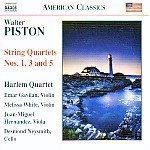
Piston: String Quartets Nos. 1, 3 & 5
 $25.00
Out of Stock
$25.00
Out of Stock6+ weeks add to cart
WALTER PISTON
Piston: String Quartets Nos. 1, 3 & 5
Harlem Quartet
[ Naxos American Classics / CD ]
Release Date: Monday 6 December 2010
This item is currently out of stock. It may take 6 or more weeks to obtain from when you place your order as this is a specialist product.
"The first thing you notice in listening to this recording is the beautiful individual and ensemble sound of the Harlem Quartet. Without ever softening its sharp edges, the group's basic sound is a consistent pleasure all by itself--just lovely string timbre with no grunting, groaning, and gasping to get in the way." (10/10 ClassicsToday Nov 2010)
"The first thing you notice in listening to this recording is the beautiful individual and ensemble sound of the Harlem Quartet. Walter Piston's music recalls that of Roussel and, above all, Martinu, especially in his penchant for driving, syncopated allegros and brooding, chromatic slow movements. Many performers have a tendency, as with Martinu (and Hindemith, and other "neoclassical" composers), to hack and slash their way through the quick movements with choppy articulation and a general disregard for that warm, singing timbre that remains the acme of fine quartet playing. The problem to some degree afflicts the only serious competition in this music, the Portland Quartet cycle on Northeastern. So it's wonderful to report that the Harlem Quartet inflects rhythm and phrases with a naturalness and ease that lets the music blossom and breathe. Without ever softening its sharp edges, the group's basic sound is a consistent pleasure all by itself--just lovely string timbre with no grunting, groaning, and gasping to get in the way.
Now for the music. Piston has a reputation for being an "academic" composer on account of his preference for non-programmatic forms and his success as a textbook writer. This is unfair. He was, to be sure, an "absolute" musician, fastidious in his craftsmanship and somewhat severe in style, but his music is nonetheless personal and striking in its directness and purity. This is particularly the case with his quartets. The works on this disc have three movements each, and none lasts longer than a pithy 17 minutes. Within these compact pieces lies a world of expression, with the slow movements of the First and Fifth quartets being particularly intense.
Harmonically this music can be elusive: Piston sometimes employs twelve-tone themes, as in the Fifth quartet, but almost always within a broader tonal framework. The dissonance never piles up to the point of incoherence. This is what some critics object to: Piston's music is always controlled, never "over the top"; it's just good, clean music. But there must be a place for this in the libraries of serious collectors, and if you're one of those, then these beautifully played and engineered performances are for you. I look forward to hearing more from the Harlem Quartet, and not just in Piston."
(10/10 ClassicsToday Nov 2010)